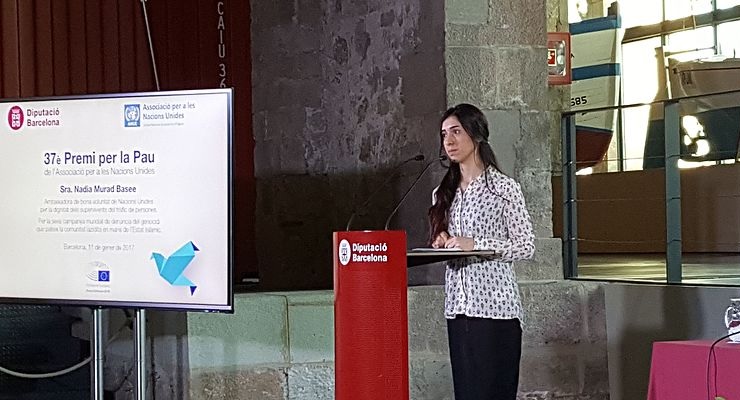
From Voice of America
Nadia Murad survived the worst of the cruelties and brutality inflicted on her people, the Yazidis of Iraq, by the Islamic State group before becoming a global champion of their cause and a Nobel Peace Prize laureate.
Murad, who was taken hostage by IS in 2014 but escaped, on Monday became the first Iraqi to receive the prestigious award.
The 25-year-old was jointly awarded the Nobel with Congolese doctor Denis Mukwege for their “efforts to end the use of sexual violence as a weapon of war.”
Murad once lived a quiet life in her village in the mountainous Yazidi stronghold of Sinjar in northern Iraq, close to the border with Syria.
“As a young girl, I dreamed of finishing high school,” she said in her Nobel acceptance speech.
“It was my dream to have a beauty parlor in our village and to live near my family in Sinjar. But this dream became a nightmare. Unexpected things happened. Genocide took place.”
The jihadists stormed across swaths of Iraq and Syria in August 2014.
IS fighters swept into her village, Kojo, killing the men, taking children captive to train them as fighters and condemning thousands of women to a life of forced labor and sexual slavery.
Murad was taken to Mosul, the Iraqi “capital” of the IS’s self-declared caliphate, where she was held captive and repeatedly gang-raped, tortured and beaten.
IS fighters wanted “to take our honor, but they lost their honor”, Murad has previously said.
‘Joyful person’
For the jihadists, with their ultra-strict interpretation of Islam, the Yazidis are seen as heretics.
The Kurdish-speaking community follows an ancient religion, revering a single God and the “leader of the angels,” represented by a peacock.
Like thousands of Yazidis, Murad was sold and forcibly married to a jihadist, beaten and — in contrast to the official wives of IS leaders — forced to wear makeup and tight clothes, an experience she later related in front of the United Nations Security Council.
“The first thing they did was they forced us to convert to Islam,” Murad told AFP in 2016.
She set about trying to escape, and managed to flee with the help of a Muslim family from Mosul.
Using false identity papers, she crossed the few dozen kilometers (miles) to Iraqi Kurdistan, joining crowds of other displaced Yazidis in camps.
There, she learned that six of her brothers and her mother had been killed.
With the help of an organization that assists Yazidis, she was re-united with her sister in Germany, where she lives today.
Even there, she says she is still fearful, for herself and other innocent women.
“I am a joyful person, I am an outgoing person, I don’t want to live in fear,” she told reporters at a press conference on Sunday.
‘Our peoples’ fight’
The Yazidis numbered around 550,000 in Iraq before 2014, but some 100,000 have since left the country.
Many others who fled their hometowns to Iraqi Kurdistan remain reluctant to return to their traditional lands.
Murad has dedicated herself to what she calls “our peoples’ fight.”
She and her friend Lamia Haji Bashar jointly received the EU’s 2016 Sakharov human rights prize.
She has called for help for some 3,000 Yazidis who remain missing, presumed still in captivity, as well as for European countries to take in displaced Yazidis.
She has also campaigned for the acts committed by IS to be recognized internationally as genocide.
The Yazidi cause has won a high-profile supporter — Lebanese-British lawyer and rights activist Amal Clooney, who was at the Nobel ceremony and also penned the foreword to Murad’s book, “The Last Girl,” published in 2017.
That same year, the U.N. announced it would begin gathering evidence on IS war crimes, crimes against humanity or genocide that would be used to try IS militants in Iraqi courts. The first Iraq field missions are set for 2019.
“So far, the perpetrators of the crimes which led to this genocide have not been brought to justice,” Murad said in her Nobel speech. “I do not seek more sympathy; I want to translate those feelings into actions on the ground.”
Happier times
Murad was in the United States when she heard about her prize, and said she was “scared” initially.
“The first thing that came to my mind was my mother, I cried a lot,” she said on Sunday.
“It was very difficult. I have received the Nobel Peace Prize from the hardship, the difficulties that all these people have been faced with and from all the hard work that we have been doing.”
In contrast to all the tragedies that have befallen her, recent pictures on Murad’s Twitter feed show happier times.
In August, she announced her engagement to fellow Yazidi activist Abid Shamdeen.
“The struggle of our people brought us together and we will continue this path together,” she wrote.
Underneath, a photo showed her next to a young man in a bow tie, her face still framed by her long brown hair, but this time, bearing a broad smile. Her fiance was in Oslo to see her accept the Nobel Peace Prize.
Leave a Reply